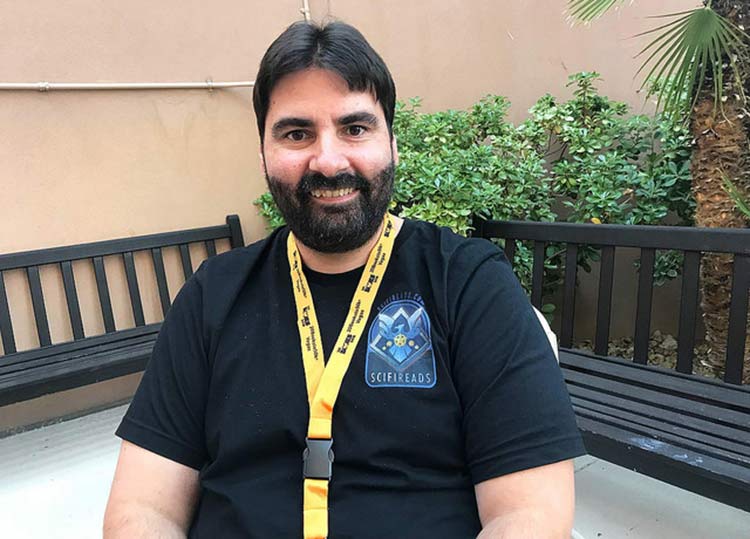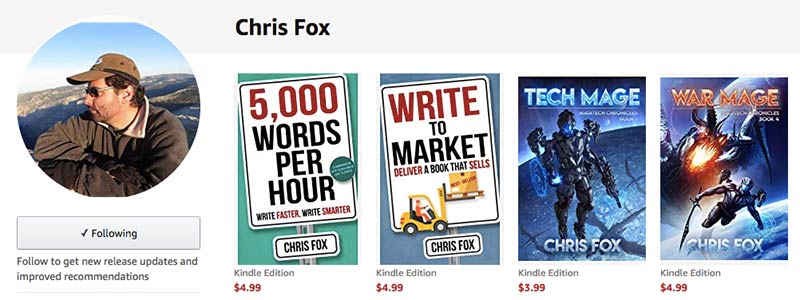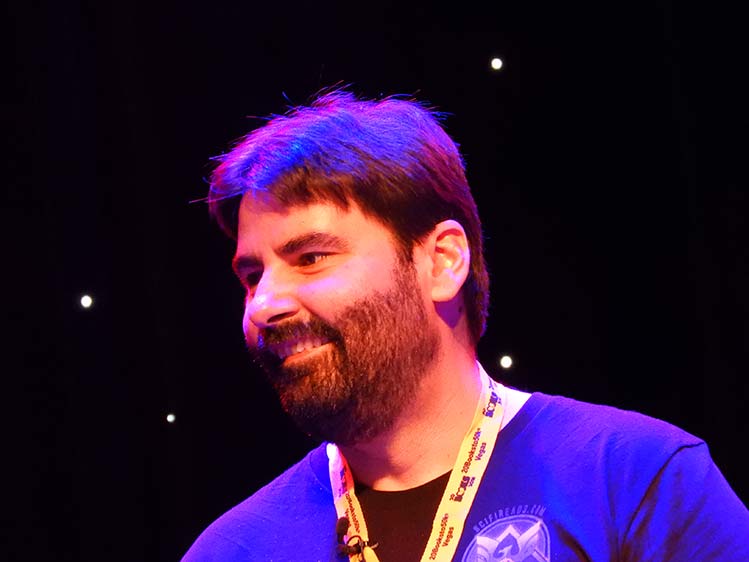
For our fourth Indie Author Spotlight feature, we spotlight Chris Fox, an indie author who has written both fiction and nonfiction, including the space fantasy novels Tech Mage, War Mage and Behind the Lines. J.D. Lasica caught up with Chris at the writers conference 20Books Vegas earlier this month.
INDIE AUTHOR SPOTLIGHT
In Novato, Marin County, just north of San Francisco.
I did, until I quit in February 2016 when I became a full-time author. I’m making more money now than I ever did as a software engineer.
Like a lot of other authors, when I was a very young child, I knew that’s exactly what I wanted to do. At six years old I said, ‘I’m going to be an author,’ and so all the way through high school I was preparing for that and taking English classes and all my English teachers were patting me on the head, saying you’re meant to do this. But then I met the real world and realized I didn’t know anything about the author business. So I abandoned it at 18 and didn’t pick it up again until I was 30 when I wrote my first short story and got it published for a grand sum of 75 bucks.
After that, I kept writing on the side. But it wasn’t until I start dating Lisa, who’s now my wife — she’d read some of my fiction and asked if I had any novels she could read. I was almost done with one called No Such Thing as Werewolves, so I finished my very first novel in 2014 to impress my wife.
What really surprised me is, I just published it as kind of a vanity publishing effort where I wanted to have a book, but then Amazon started sending me checks. By the third month, the audiobook came out and I got a check for $4,000. And all of a sudden, I realized, wait a minute, there’s a lot of money in this. And we just happen to live in the beating tech capital of the world. So I was surrounded by Amazon employees, Apple employees, and I saw what they were doing with data science. And I saw how they were building an engine to sell stuff to people. And I realized as an author, we can tap into that. We can use data science to get our books front and center in such a way that that’s what people are clicking on. And if people are clicking on our books, that’s what Amazon is selling. And it’s worked. That’s where almost all my sales come from.
Yeah. I’ve got seven nonfiction books, but they’re all very short. And 80 percent of the revenue comes from the fiction. So my novels are paying the bills.
I write mostly science fiction in different flavors. I have post-apocalyptic science fiction, military science fiction, and my latest series I would call space fantasy. So think dragons and mages in space and starships.

I sort of built it from scratch. I was already writing military science fiction. And I said to myself, I want to get into epic fantasy, because that’s my true love. But I know my readership is not going to follow me. So I wondered, can I do a military science fiction with all of the same elements of epic fantasy and will that work? And so I decided I’d try an experiment and it worked.
That was the original impetus. But it was also based on my epic fantasy universe. l use the same magic system, and a lot of the same world building in some of the same gods. So I already had a lot of material and I wanted to play around with something in space like this. So I’ve been having so much fun writing the Magitech Chronicles.
It’s not as large as I’d like because I’m always jumping around from series a series. I have a YouTube channel with 27,000 followers and 1.5 million views. So I would guess that a lot of my fans are coming from that. I’ve gotten a lot of them from Amazon because Amazon’s promoted a lot of my books as well and I put calls to action to sign up for my mailing list in the front and back matter in my books.
I just spoke at the Pacific Northwest Writers Association. And pretty much everybody there was looking for an agent deal. And I gave a presentation and I explained all the things that you get as an indie author and there was a lot of interest. Really it boils down to just one word: control. You can do what you want, when you want. Whereas if you’re working with a traditional publisher, I’ve had friends have been asked to remove characters, to add romantic subplots, to really alter the book, and you’re not going to see it published for 18 months to two years after you’ve signed this deal. And then the money is not very good.
I think we’ve see an explosion of content. And not all the content is good, but a lot of it is. And the beauty of Amazon’s system in terms of selling books is a meritocracy. So if readers like the books, those are going to rise to the top. We just have so much more quality stuff that we had back in, say, 2011. I spoke to a romance author and they’re really the ones that kicked off the Kindle boon back in 2010-2011. And she said, I just needed a way to reach her readers, and was through the Kindle.
We don’t need a middleman anymore. As an author, you can find your audience. There’s a niche of people somewhere in the world who wants to read whatever crazy stuff you’re writing. And now you can find them. That wasn’t true 10 or 15 years ago.

They have no idea. If you asked the average reader, ‘Who published this book?,’ they’re going to say the author’s name and that’s it. All they know is, I enjoyed this, and I want to read the next one.
Surprisingly well. I’ve sold about 30,000 copies of that book. It’s also free on my website. The thrust of the book is straightforward. I only had an hour a day as a software engineer working 12 to 14 hours a day. But I would take the bus into San Francisco and I had that hour and I was able to maximize my writing time. So the book explains what I what I did and all the little mental tricks and neuroscience things I was using to up my word count.
I suspect you’re going to see hybrid publishers rise up who are able to give you things that you can’t get elsewhere like getting you into chain bookstores. But that’s less important than it used to be, especially if you’re trying to reach a global audience. So I suspect that in 10 or 15 years, indie publishing will be truly embraced. So while you’ll never see traditional publishing going away, it’ll become the niche and self-publishing will be the mainstream.
Chris and I sat down for an in-person interview at 20Books Vegas. This transcript was edited for length. For more information about Chris’s work, visit ChrisFoxWrites.com, follow him on Twitter @scholarlyfox or on Facebook at his author page.
Indie Author Spotlight — Other Q&As in this series
- Indie author spotlight: Michael Anderle
- Indie author spotlight: Nicholas Sansbury Smith
- Indie author spotlight: David Gaughran
I love all your books and think they’re the best on the market for strategy. I was wondering about your Launch to Market.
Are there any updates on the marketing, or do you still recommend the strategy you have in that book without any changes?
Thalia, Chris has a new book out that may address this: “Ads for Authors” came out three weeks ago. And his book “Write to Market” still holds up well.